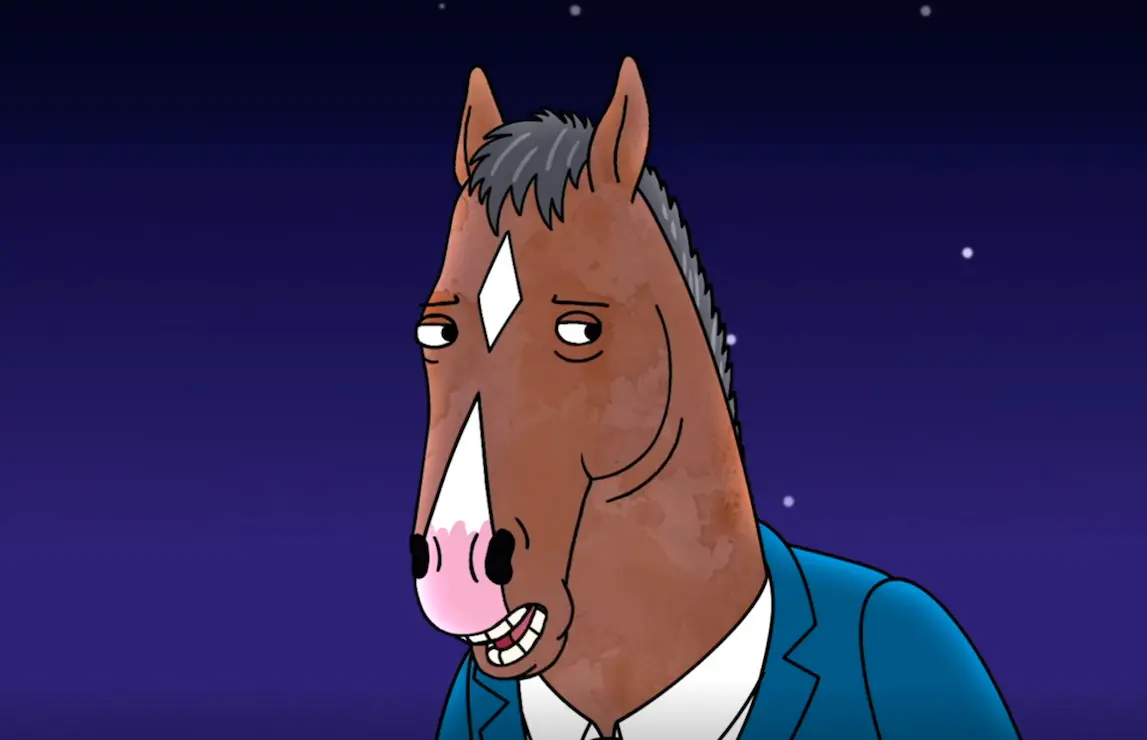Parsing the Meaning of the BoJack Horseman Series Finale
-
 BoJack Horseman (Netflix)
BoJack Horseman (Netflix)BoJack could not have been worse-off heading into the final half-season of BoJack Horseman. The washed-up actor-turned-Wesleyan professor of acting had seemed to be turning his life around, sobering up and staying clean. But his demons — and their deeply negative impact on others — came home to roost in the mid-season finale, “A Quick One, While He’s Away.” Thanks to the work of reporters Paige Sinclair and Maximillion Banks, BoJack’s involvement in his former co-star Sarah Lynn’s death was revealed, and he was made into a public pariah.
Unfortunately for him, that wasn’t his lowest point.
Warning: This is the point of no return for spoilers for the final half season of BoJack Horseman. If you haven't yet seen the final epsodes and want them to remain unspoiled, turn back now.
After perhaps his worst bender ever, BoJack breaks into his former home and goes for a swim. He appears to drown — although it’s not quite clear. The question of the final stretch of episodes becomes: Is BoJack dead? And if so, how does that change our interpretation of the ending?
The penultimate episode, “The View From Halfway Down,” is a surreal piece in which BoJack looks back on his life in purgatory, surrounded by those in his life who have died before him. It’s an abstract episode for sure, similar to the Season 4 masterpiece “Time’s Arrow” in its use of animation to express themes that words themselves cannot. Nothing is more exemplar of that than a mysterious black substance that drips on and near BoJack throughout the entire episode, only to finally consume him at the end. The substance is very clearly coded as death, as it takes all those who passed before BoJack in its grip.
But then, somehow, BoJack survives. He wakes up from a coma in the series finale, “Nice While It Lasted,” and is jailed for breaking and entering into his former home. We catch him on the weekend of his longtime agent and friend Princess Carolyn’s wedding, as he’s released back into the world for the night to attend. We get scenes between him and all the principal characters — Mr. Peanutbutter, Princess Carolyn, Todd, and Diane. It’s like a play made up of five scenes, each acting as a sort of a farewell for each character, wrapping up BoJack’s relationship with them.
Now on the one hand, you could say this makes sense for a series finale. But every scene is so succinctly written, tying up each plot point with such a tidy bow, that it feels entirely different from the rest of the series. There are two possible explanations for this: Either 1) the pressure of a finale affected the show's otherwise-impeccable writing, or 2) BoJack isn’t actually alive, and this entire episode is a reflection of what his afterlife looks like.
Opinions among fans who've weighed in on the finale are split. In tribute to that disparity, let’s consider what it means if BoJack is or isn’t dead, and what the ambiguity tells us about the writers’ intentions for the ending.
What does it mean if BoJack is dead?
In my opinion, this is the proper ending for the series. A shot of a flatline happening at the start of the fainal episode, before BoJack wakes up, would suggest this is the case. BoJack coming back to life feels unrealistic, and the writing in the finale, while beautiful, is far too on-the-nose for me to believe it’s meant to be taken realistically. These are characters with years of history with BoJack, and they somehow summarize their entire dynamic with the lead character in five-minute vignettes. It’s remarkably efficient and not particularly poetic.
It becomes poetry, however, if you imagine these vignettes as BoJack’s way of finding some peace in the afterlife. Suddenly the things that kept these characters from communicating honestly and brazenly in real life have fallen away, and BoJack can finally repair the damage he’s done. He finds comfort in his relationship with Princess Carolyn, simplicity with Mr. Peanutbutter, forgiveness from Todd, and actually has to grapple with his demons with Diane. It’s a morality play of sorts, and viewed as the thoughts of a dead man, it works.
What does it mean if BoJack isn’t dead?
There’s certainly an argument to be made that death would be too good for BoJack — that it would be an escape from atoning for the damage he’s done to others. But I honestly think that argument doesn’t work considering how clearly BoJack didn’t want to die. If his was a suicidal act by a scared man, then yes, I would agree death is too good for him. But as it’s depicted in the show, BoJack’s greatest fear is death, not staying alive. He may not have been capable of repairing the damage he caused, but he did very clearly want to. (Hence blowing up his career and life to be honest about what happened with Sarah Lynn.)
In terms of the ambiguity of the finale, I can imagine creator Raphael Bob-Waksberg and his team wanting to leave just a little window of doubt open — enough to keep fans talking about the show for long after it’s gone. And I appreciate that! But for me, BoJack is dead — just like Bojack. And I’ll miss them both deeply.
People are talking about BoJack Horseman in our forums. Join the conversation.
Kevin O'Keeffe is a writer, host, and RuPaul's Drag Race herstorian living in Los Angeles.
TOPICS: BoJack Horseman, Netflix, Raphael Bob-Waksberg, Series Finales
- Stealing Boggle Trophies: When Celebrities Take on the Villain Cameo
- By the Numbers: Which Netflix Shows Have Run for 5 Seasons or Longer?
- BoJack Horseman creator responds to Dave Chappelle controversy by revealing a David Fincher joke Netflix forced him to cut to raise money for a trans charity
- The Best UK-Style Holiday Specials on Netflix